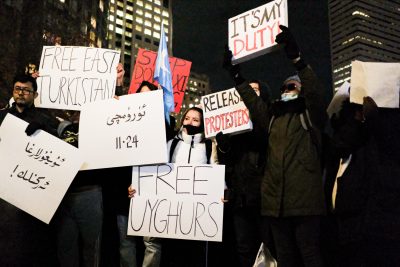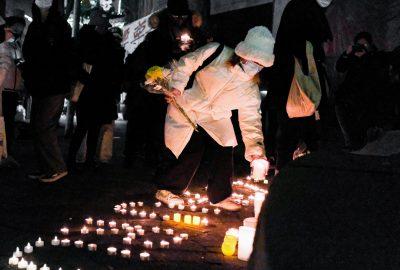
Chanting “Free China” and “Freedom,” more than a hundred people gathered at Tiananmen Memorial in Boston to mourn for the victims of the Urumqi fire and protest China’s strict COVID-19 restrictions on Dec. 2.
Protestors came to protest China’s zero-COVID policy after a fire in a high-rise apartment left at least 10 people dead on Nov. 24. This happened in Ürümqi, the local capital of Xinjiang, where residents were blocked from leaving their homes under COVID-19 restrictions.
Posts on Chinese social media suspected the lockdown contributed to the deaths, since people were unable to escape due to the blocked fire exits and entrance.
Harvard Medical School student Maggie Guo who grew up in Shanghai, said that the country’s COVID-19 policies were “unnecessary.”
“When my mom was experiencing (COVID-19 testing), everyone got squeezed into one elevator getting downstairs and everyone getting up in line, so crowded and getting tested,” Guo said. “During the process, a lot of people actually got COVID.”
Guo expressed pride for her home country but called the “denial attitude” a reason for “going back in history.”
“I love the city I grew up in for 20 years, 18 years,” said Guo. “It changed so much, and it’s devastating to see my city being treated like this.”
Dylan Benson, a Boston resident, said he believed the policies are a way to control the population in areas like Tibet.
“The economic consequence for all Chinese people is so severe, and then the isolation as well I think is a huge consequence,” Benson said.
The organizers wrote in an email that the purpose of this event is to mourn the loss of the victims and provide a safe communication space between the Uyghur community and the mainlanders.
“We would also like to take this opportunity as a platform for the Chinese community in Boston to practice their freedom of expression and freedom of assembly,” they wrote in an email.

Ziyan Tang, a graduate student from Brandeis University, said he attended the vigil to show his attitude and find what he can do for his family and friends in China. Tang noted the community the vigil created could encourage a higher turnout and “be more brave.”
“Many participants who have their first experience here, and they heard and they saw other people here,” Tang said. “They know they are not alone … I really think that is to be a seed for those participants in the future.”
Wei-Ting Chen, an activist from Taiwan and a graduate student at Tufts University, said he supported Chinese democracy for over 10 years. Chen reflected on how the vigil served as the first experience to join a protest and places roots for the future of the movement.
“I don’t believe that one event, one seed in one corner will change CCP’s (Chinese Communist Party) regime right away,” Chen said. “Many of these Chinese students will be their first time or they probably very rarely experienced in their life to join this kind of protest. You are going to put a seed in their heart.”
There was also a vigil and march at Harvard University the following day in front of Widener Library to show support.



















































































































